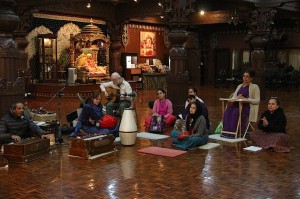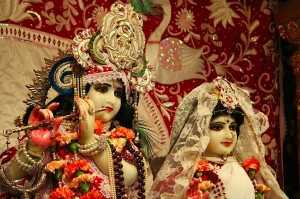The Mahabharata is a fascinating book with many of its characters not clearly black or clearly white, but multiple shades of grey.
Karna is an intriguing character – virtuous, yet choosing the side of the vicious Kauravas; born as a warrior, but treated lifelong as charioteer’s son; great archer, but defeated and killed in a fight with another great archer.
Let’s see where he falls on the spectrum of black to white through a series of question-answers.
Was Arjuna’s killing Karna when he was chariot-less not unfair, being against the kshatriya codes?
The unfairness had begun from the Kaurava side decades earlier when they tried to poison Bhima and burn the Pandavas alive.
In the Kurukshetra war, at its start the commanders of the two sides had agreed upon the codes to be followed in the war. Dhrishtadyumna, the Pandava commander, had declared that their side would not break the war codes first, but if the Kauravas broke those codes first, then the Pandavas would not let themselves be held back by the war codes.
In the ensuing battles, the kshatriya code that a chariot-less warrior should not be attacked was violated first by the Kauravas’ side. On the thirteenth day, six of their maha-rathas including Karna ganged together to kill the chariot-less Abhimanyu. So, Karna simply reaped what he had sown – he violated the code first by attacking the chariot-less Abhimanyu and was paid back in kind, as had been agreed at the start of the war.
And the unfair attack on Abhimanyu was not a one-off incident on the part of the Kauravas. On the fourteenth day when Arjuna was striving to fulfill his vow to kill Jayadratha by sunset, his horses got exhausted, and needed rest and water. While Krishna decided to lead the horses away, Arjuna had to get off the chariot. Even on seeing him chariot-less, the Kaurava forces did not stop attacking him. To the contrary, they attacked him with greater ferocity, hoping to fell him in his dangerously disadvantaged condition. Still Arjuna held them back with his expert archery while simultaneously using mystical weapons to arrange for shade and water for his horses. In an all-out war, quarters are rarely given and Arjuna didn’t ask for them – neither should Karna have asked.
Karna himself violated that specific code on the seventeenth day during his confrontation with Arjuna. When Karna sent an unstoppable mystical weapon at Arjuna’s head, Krishna forcefully pushed the chariot into the ground so that the arrow hit Arjuna’s crown instead of his head. Arjuna’s life was saved, but his chariot got stuck in the ground. While Krishna jumped off the chariot to get it out of the ground, Arjuna was disadvantaged with an immobile chariot. Karna still attacked him and Arjuna didn’t ask to be spared, but fought back and defended himself.
So in the final confrontation, Karna’s reminding Arjuna of the kshatriya code was hypocritical. When Karna tried to take the high moral ground, Krishna exposed him thoroughly by listing all the times when Karna had paid scant regard to morality. Krishna’s fitting riposte silenced Karna whose head fell in an admission of his guilt.
Krishna deciding to illustrate the principle of shatho shathyam: with the cunning, one can be cunning, asked Arjuna to shoot Karna. By countering Karna’s arguments, Krishna had signaled to Karna that Arjuna would not desist from attacking. Karna could have taken that as a warning, re-mounted his stationary chariot and resumed fighting – or he could have fought from the ground itself, as had Arjuna on the fourteenth day. His neglecting Krishna’s warning was a monumental blunder that cost him his life.
Was Karna a better archer than Arjuna?
Let’s look at the relevant incidents in the Mahabharata.
1. The first Karna-Arjuna encounter was in the martial exhibition organized by Drona to showcase the skills of his students, the Pandavas and the Kauravas, for the pleasure of Hastinapura’s leaders and citizens. In that exhibition, Arjuna excelled all till Karna gatecrashed and demanded a chance to exhibit his skills. When granted that chance, Karna equaled the performance of Arjuna, though he had initially claimed that he would surpass Arjuna. Then, Karna asked for a chance to duel with Arjuna, but while the logistics were being worked out, the sun set and the duel couldn’t take place.
Result: Draw. Score: Arjuna – 0, Karna - 0
2. When Drona asked that as his guru-dakshina, his students defeat and arrest Drupada, the Kauravas sped off accompanied by Karna. But Drupada at the head of his forces defeated them. Then the Pandavas led by Arjuna attacked Drupada’s forces, and Arjuna defeated and arrested Drupada, doing what Karna couldn’t do.
Result: Arjuna demonstrated his superiority. Score: Arjuna – 1, Karna – 0
3. During Draupadi’s svayamvara, when Arjuna, dressed as a brahmana, won the princess’ hand, the kings felt that Drupada had insulted them by giving his daughter to a brahmana instead of a kshatriya. So they attacked Drupada. To defend their father-in-law, Arjuna and Bhima intervened and held the kings back till it became a face-off: Karna vs. Arjuna and Shalya vs. Bhima. While Bhima bested Shalya, Arjuna more than matched Karna, who thereafter decided to desist from the fight, saying that he would not fight with a brahmana.
Result: Draw. Score: Arjuna – 1, Karna – 0
4. When the Pandavas were living in exile, Duryodhana, at the instigation of Karna, decided to rub salt into their wounds by flaunting his wealth in front of them. But some Gandharvas who were sporting in that area blocked Duryodhana. In the resulting confrontation, the Gandharvas defeated the Kaurava forces, wounding Karna and causing him to flee, and then arresting Duryodhana. Later, when some Kaurava soldiers appealed to the Pandavas for help, Arjuna routed the same Gandharvas who had routed Karna, and released Duryodhana.
Result: Arjuna again demonstrated his superiority. Score: Arjuna – 2, Karna – 0
5. During the Virata battle, Arjuna fought single-handedly against the entire Kaurava army and defeated all the Kaurava generals including Karna. This was the greatest solo performance in the entire epic.
Some people argue that this contest did not accurately reflect their skills because Karna had not carried his Shakti weapon. But who is responsible for Karna’s not carrying the weapon? Isn’t a warrior expected to carry his best weapons when going for war? (Imagine a batsman after getting clean bowled for a duck in a World Cup final rationalizing his cheap dismissal: “I got out because I forgot to carry my best bat to the crease.”) And Arjuna did not get his formidable array of weapons for free – he performed severe austerities in the Himalayas to appease the gods and painstakingly add each powerful weapon to his formidable arsenal.
Result: Arjuna won fair and square. Score: Arjuna – 3, Karna – 0
So, even before their final decisive confrontation on the seventeenth day of the Kurukshetra war, Arjuna had unambiguously established his superiority.
(To be continued)





 Indradyumna Swami: The other day we visited the house where Srila Prabhupada stayed with his Western disciples during a visit to Surat in 1970. Many of the local people vividly remembered His Divine Grace. To celebrate our visit we chanted in the same streets that Srila Prabhupada sent his disciples out to do harinam in 44 years ago. In this album I also include never-before seen black and white photos of Srila Prabhupada's visit to Surat.
[ Majority of Photos by Ananta Vrindavan das ]
Indradyumna Swami: The other day we visited the house where Srila Prabhupada stayed with his Western disciples during a visit to Surat in 1970. Many of the local people vividly remembered His Divine Grace. To celebrate our visit we chanted in the same streets that Srila Prabhupada sent his disciples out to do harinam in 44 years ago. In this album I also include never-before seen black and white photos of Srila Prabhupada's visit to Surat.
[ Majority of Photos by Ananta Vrindavan das ] 


 Pure, vegetarian, wood-fired pizza prepared according to traditional Italian recipes right inside of Mayapur's Iskcon temple.
Pure, vegetarian, wood-fired pizza prepared according to traditional Italian recipes right inside of Mayapur's Iskcon temple. 

 Coolangatta is the southernmost suburb of the Gold Coast, Queensland, Australia.
Coolangatta is the southernmost suburb of the Gold Coast, Queensland, Australia.  Jayapataka Swami invited all the Sri Mayapur GBCom Members and deputies for afternoon lunch prasadam feast (Lotus Roof Top) at his residence.
Jayapataka Swami invited all the Sri Mayapur GBCom Members and deputies for afternoon lunch prasadam feast (Lotus Roof Top) at his residence.  PIZZERIA Home Delivery service, in and around Mayapur?
PIZZERIA Home Delivery service, in and around Mayapur?  The bliss continues for one and all!
The bliss continues for one and all!  The UK is experiencing massive floods even here at Bhaktivedanta Manor, no real damage was done except to Arjuna Prabhu's caravan. It is scary to wake up in a flood.
The UK is experiencing massive floods even here at Bhaktivedanta Manor, no real damage was done except to Arjuna Prabhu's caravan. It is scary to wake up in a flood. 
 During the first stage, love begins as a vague feeling and gradually becomes very specific and clear. The divine love realized in the second and third stages takes the form of a very clear and tangible personal relationship with Krishna. There are infinite flavors of divine love, and infinite varieties of relationships with Krishna, because there are infinite individuals. Still, its helpful to classify the flavors of loving relationships into five broad, main categories.
During the first stage, love begins as a vague feeling and gradually becomes very specific and clear. The divine love realized in the second and third stages takes the form of a very clear and tangible personal relationship with Krishna. There are infinite flavors of divine love, and infinite varieties of relationships with Krishna, because there are infinite individuals. Still, its helpful to classify the flavors of loving relationships into five broad, main categories.
